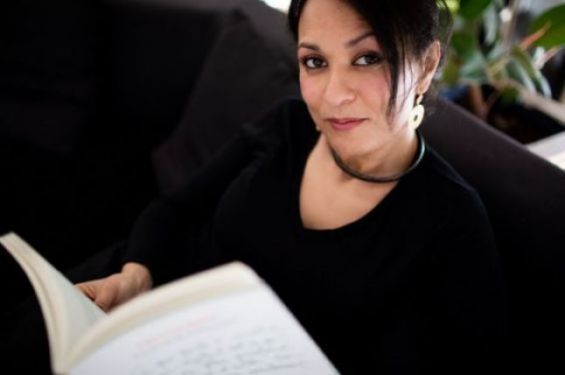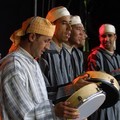Another book, another success. Both her readers and literary critics acclaimed her for her latest opus. Meet French-Moroccan writer Leïla Bahsaïn-Monnier, who authored «La théorie des aubergines» (‘The eggplant theory’), published by Albin Michel, her second novel. The Morocco-born writer has received numerous prizes for her short stories and two novels, across different literary genres.
A native of Salé who grew up in Marrakech from the age of 8, the writer has indeed won the Mediterranean Prize, a French literary award, for her first novel for «Le ciel sous nos pas» (‘The sky under our steps’), becoming one of the first women and Moroccan to receive the famous distinction. The book also won the European and Mediterranean book prize, which was awarded to renowned writers such as Eric Fottorino.
«Success is a marathon, not a sprint», the old saying goes. Indeed, for Leïla Bahsaïn, the marathon started when she was a child. Born to a teacher mother and a father working in the hotel industry, she had, from a young age, access to literature books «which were more intended for older readers». «I read what I could find at home or in hotels where my father worked, so it was not necessarily children's literature», the writer said.
.jpg)
The secret to her great writing skills is necessarily due to her early exposure to great literature, according to her. Indeed, she believes that it has also allowed her to develop an innate rigor in the construction of her stories. Passionate about both Arabic and French literature, she adores reading classical pieces in both languages. From Maupassant to Flaubert to Victor Hugo and all the way to Naguib Mahfouz in Arabic and translations of his works, she is no stranger to famous pieces of literature. «I remember that I liked to have fun with letters and words, to the point where it greatly helped me to learn to read and write very quickly», Leïla recalled.
Entrepreneurship in the service of literature
After completing her secondary studies at the Hassan II high school, then at the Higher Institute of Commerce and Business Administration (ISCAE), Leïla completed a master's degree in management at IAE Besançon, France, and was crowned class valedictorian. After going back and forth from Morocco to France, she decided to settle down in France where she made her first steps in the world of entrepreneurship as a human resources consultant. From then on, her career took off and she became integration advisor, then director of a communication agency in Besançon.
Her first successes in entrepreneurship would not distract her from her first dreams however. While working, Leïla Bahsaïn moonlighted as a writer and sent her first short stories to the Literary Magazine of Morocco, which organized a competition open to readers. And voilà, from then on, she had become a published writer: in 2011 her short story «100 dirhams» won her very first award. Proud of her first achievements, she would not stop there: in 2013, she contributed to the collective collection «Moroccan short stories». Her achievement would motivate her to publish more writings in the same genre, which eventually got published by magazine Apulée.
«I feel lost and out of place when I work in a position within a company that does not have a human face. This is why my writing is not above ground and is attached to reality. I have always been close to this reality of the modest people. I grew up in a mixed social fabric and it allowed me to get a global understanding of society. These life-learning experiences can be found in my writings, especially since I come from a family that is very focused on social work».
Leïla Bahsaïn-Monnier's short stories were highly successful. She draws her inspiration from her life experiences between Morocco and France, but also from the social conditions and lives she has known through her experience in HR, management and integration advisory. While working, she would not lose sight of her love for writing. Indeed, Leïla believes that her years in the business world were a springboard to the world of literature. Hence her retirement from entrepreneurship in 2018, ending ten years of work, to devote herself entirely to her writing career.

A year later, Leïla Bahsaïn took the plunge and completed her first novel «Le ciel sous nos pas» (‘The sky under our steps’). But its publication came about in an unexpected way.
«I sent the manuscript by post mail to French publishing houses. They say that a lot of the draft books sent this way are never read by the publishers, especially the big houses. Also, I didn't know anyone in the publishing industry back then. So when I sent my manuscript, I didn’t make much of it. Yet two days later I received a reply from two houses and signed a contract with publisher Albin Michel».
Highly acclaimed by literary critics in France, especially by newspaper Le Monde, her work was presented at the International Book and Publishing Fair in Casablanca in 2019 and in French schools in Morocco. «All I did at work was while waiting for literature. I told myself that I was going to feed on everything I lived and saw to better serve literature», the writer recalled.
In her eclectic life, Leïla always found some time for social endeavors. In 2009, she profited from a long stay in Morocco to create the Zitoun Association in her grandparents’ village of origin, in the province of Mechat-Chichaoua. Alongside her teacher of a mother, she decided to provide literacy classes. Her social work allowed, in the first year, to help 60 women. Since then, and thanks to support from the State and funding from the Moroccan Literacy agency, her social projects took off.
Today, «several hundred women and men every year (400 to 500) follow the classes», Leïla explained. The activities were extended to other areas, such as preschool classes, occasional ecological and cultural activities or even training workshops for young people.
Questioning integration
Passionate for women questions, Leïla also addresses the theme in her writings alongside the identity theme. «When you combine the labels of woman, North African, Muslim and Arab, it becomes difficult to assert yourself on a daily basis», she said. «In everything I write, we find questions of identity that I am constantly digging into. Basically, my observation is that we never question our own identity which is beyond us, as it is something alive and changing. It is always the others who seize your identity to simplify things», the writer explained.
This dimension can be found in her latest novel, which tackles topics of domination, the relationships between men and women and individual destinies, while discussing today’s world. «There is class domination, racial contempt and gender contempt», she explained while describing her latest book. «It's a novel with dialogues and a lot of characters, where we respect the language of each character, something that is not easy in the construction of a text». A poetry lover, Leïla Bahsaïn was able to take up the challenge of «bringing together all these genres and all these requirements» in the same story.

The story is told by the narrator, Khadija, also known as «Dija Ben», who took up the nickname to better fit into the French environment. Dija is an «editor in a communication agency who wanted to be a writer. She loses her job due to several factors, including the fact that she has difficulty adapting to the constraints of digital technology which has imposed a form of language impoverishment», the author said.
After a period of unemployment, Dija gets married to a Frenchman, gives birth to two children and is often on the phone with her mother. «She eventually gets invited to join a work integration enterprise for marginalized people, and is hired to communicate on the project, but as a contractor». Several people from all walks of life are brought together in this kitchen, each with their own backstories, under the leadership of chef Achour who helps them rebuild themselves.
«I was faced with a lot of difficulties but I was always overwhelmed with optimism. That’s why despite the story, the book ends on an optimistic tone. I grew up in Marrakech and the city is known for its joie de vivre. This gives the ability to talk about serious subjects with a touch of self-deprecation, combining lucidity with comedy».
For the writer, «The eggplant theory» is also a way of bringing together all these fringes of the marginalized population within the French society, while showing the limits of the idea of inclusion. Leïla also believes that inclusion is strikingly similar to what foreigners must endure to integrate in their new societies. These are forms of contempt to which Dija is exposed and which refer her to her Moroccan, Maghrebi and Arab identity.





 chargement...
chargement...













